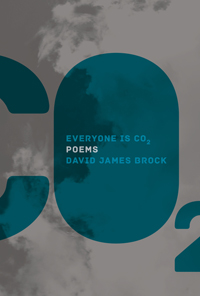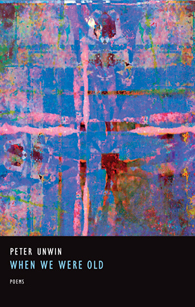Reviews
Poetry Reviews by Alisa Gordaneer
David James Brock, Everyone is CO2 (Hamilton: Buckrider, 2014). Paperbound, 64 pp., $18.
Peter Unwin, When We Were Old (Toronto: Cormorant, 2014). Paperbound, 70 pp., $18.
These two first collections of poetry share a common sense of memory, of reminiscence transfigured by a poetic sensibility, and a range of stories that may or may not be true. In one, the voice of a younger man comes through, in the other, an older man’s voice asserts itself. In either case, they’re tales told slant, through a focus on images and moments rather than the larger narrative, or by presenting various memories as poetic narrative.
Everyone is CO2, by Toronto poet and playwright David James Brock, journeys  through an imagination determined to embrace the vastness of its own potential, trying out various poetic forms, and speaking in a multitude of voices. It can take on the persona of an apocalyptic mother, as in “Mercury,” or an all-knowing commentator who sees through social veneers to the tired truths of contemporary living: “It wasn’t long ago, the Las Vegas mothers / slept without the sheets, got some tongue from the city’s hum. // There is peace in the outskirts, and there is safety in the battle / against dust bunnies. One got a Crock-Pot and now/ the Las Vegas mothers go nuts for cactus fruit stews. Old stories / are branded to the lower backs” (“Las Vegas Mothers”). The voice is strongest, though, when it speaks in the forthright first person, as it does in “Asshole, Werewolf, Hangover,” a recounting of a prickly morning after the night before: “From the bed, the spin. The blinds are open. / The sun is a jerk. Last night a werewolf bit me.” Brock’s poems are peppered with references to popular culture (one title is “I Saw Rob Reiner’s Stand By Me When I Was Eight Years Old”), which situate the first-person narrator clearly in time—you can build an impression simply by referencing the films and bands (TLC, Radiohead, The Lemonheads, and more). As such, the more experimental “Sewing the Earthworm: A Libretto” and historic “Gilgamesh: A Libretto,” seem to steer this collection away from the sharper observations that make it stand out.
through an imagination determined to embrace the vastness of its own potential, trying out various poetic forms, and speaking in a multitude of voices. It can take on the persona of an apocalyptic mother, as in “Mercury,” or an all-knowing commentator who sees through social veneers to the tired truths of contemporary living: “It wasn’t long ago, the Las Vegas mothers / slept without the sheets, got some tongue from the city’s hum. // There is peace in the outskirts, and there is safety in the battle / against dust bunnies. One got a Crock-Pot and now/ the Las Vegas mothers go nuts for cactus fruit stews. Old stories / are branded to the lower backs” (“Las Vegas Mothers”). The voice is strongest, though, when it speaks in the forthright first person, as it does in “Asshole, Werewolf, Hangover,” a recounting of a prickly morning after the night before: “From the bed, the spin. The blinds are open. / The sun is a jerk. Last night a werewolf bit me.” Brock’s poems are peppered with references to popular culture (one title is “I Saw Rob Reiner’s Stand By Me When I Was Eight Years Old”), which situate the first-person narrator clearly in time—you can build an impression simply by referencing the films and bands (TLC, Radiohead, The Lemonheads, and more). As such, the more experimental “Sewing the Earthworm: A Libretto” and historic “Gilgamesh: A Libretto,” seem to steer this collection away from the sharper observations that make it stand out.
When We Were Old is Toronto writer Peter Unwin’s first book of poetry, adding a new dimension to an oeuvre that includes a collection of essays, a book of short stories, and a novel. As such, Unwin’s considerable narrative skills come to the fore in this work, following an arc of life experiences, from courtship and early parenting through the questioning and domesticity of middle age, to the challenges of aging. Populated by cats and coffee, sly humour, and quiet observations about pivotal, or simply noticed, moments in a busy life, these poems tell a story as forthright as a memoir, almost blurring the lines between poetry and creative nonfiction.
new dimension to an oeuvre that includes a collection of essays, a book of short stories, and a novel. As such, Unwin’s considerable narrative skills come to the fore in this work, following an arc of life experiences, from courtship and early parenting through the questioning and domesticity of middle age, to the challenges of aging. Populated by cats and coffee, sly humour, and quiet observations about pivotal, or simply noticed, moments in a busy life, these poems tell a story as forthright as a memoir, almost blurring the lines between poetry and creative nonfiction.
This book’s narrative isn’t direct, but its early poems with sippy cups, bicycles, and the small but keenly felt losses of childhood, give way to the experiences of an older narrator. The voice remains steady through its multiple roles. Earlier poems place the narrator as a devoted dad and husband: “We had four sick children / sneezing on the carpet, and in the morning / the sun was stuck in our throats” (“After the Party”), while later poems situate him as a lone individual facing his own mortality, as in “Come Back in Six Months”: “According to the doctor / I’m not dead yet. Fungus is sprouting / optimistically from my lungs, my / heartbeat remains fanatical.” It’s this being who seems to realize his sardonic sense of humour (as expressed earlier, particularly in “Confessions of a Homemaker”) must come from somewhere, and must be tempered by a deeper caring. This shows clearly when he reflects on caring for, and losing, elderly parents, as in “Father”:
You suffocated your doubts with maps
And bargains scissored every morning
From the newspaper. Sometimes fear
Wet your eyes and made me want to embrace you.
To say, “Father, my dear father, you tried,
You failed. You’re no different from anyone.”
Throughout, the narrator relates incidents with friends, family members, relatives of various sorts. Many of the more confessional moments could be equally at home in a memoir—for example, the second and closing stanza of the poem “Return from High Falls”: “All day we paddle through the low alders. / Michael, in the stern, explains that Elaine / wants to tie him naked to a chair. / These are end-of-trip confessions only. Later, / on the highway, we brake for a moose that breasts / eight lanes of traffic and lands in one piece / on the other side.”
Weighty as a moose in traffic, perhaps, but the moments of memoir are often like that, especially as they are here, encapsulated in amber-toned poems. Like much memoir, this book is an easy read, a glimpse into personal experiences that are so universal they deserve a moment of their own.
—Alisa Gordaneer









